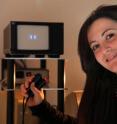It's all in your head. No, really: How mental imagery training aids perceptual learning
Practice makes perfect. But imaginary practice? Elisa Tartaglia of the Laboratory of Psychophysics at Switzerland's Ecole Polytechnique Federale de Lausanne (EPFL) and team show that perceptual learning—learning by repeated exposure to a stimulus—can occur by mental imagery as much as by the real thing. The results, published in Current Biology, suggest that thinking about something over and over again could actually be as good as doing it. "When trained, radiologists are able to detect anomalies on medical images which are extremely hard to detect for untrained people," Tartaglia says. "The results of our study would predict that mental imagery training, hence, repeatedly mentally visualizing the anomalies that one wants to detect, would be sufficient to become able to detect them."
In a series of experiments, the scientists asked some participants to practice identifying which line, the right or the left in a series of parallel lines, a central line was closest to and to identify it by pushing the correct button. In follow-up, "post-training" exercises, these participants improved their baseline performance significantly. But so did another set of volunteers who, instead of practicing with all three lines in training, were instead asked to imagine the bisecting line's proximity based on an audio tone. This group also improved their performance significantly in further testing, meaning that "imagery training" was sufficient for perceptual learning.
Some experts question the relevance of mental imagery in this kind of learning, which is generally assumed to be driven by stimulus processing—synapses firing in response to a physical cue. Here, the researchers show that perceptual learning can also occur by mental imagery, i.e., in the absence of physical stimulation. The results help shine a light on what has been an ongoing puzzle in the field and suggest an overlap in how—and possibly where—mental imagery affects perceptual learning.
Source: Ecole Polytechnique Fédérale de Lausanne
Other sources
- Learning by imagining: How mental imagery training aids perceptual learningfrom Science DailySat, 5 Dec 2009, 1:28:23 UTC
- It's all in your head. No, really: How mental imagery training aids perceptual learningfrom Science BlogThu, 3 Dec 2009, 19:21:50 UTC
- It's all in your head. No, really: How mental imagery training aids perceptual learningfrom PhysorgThu, 3 Dec 2009, 18:35:35 UTC
